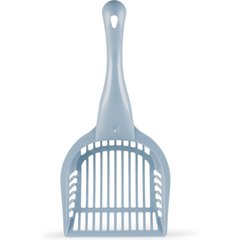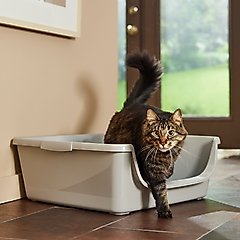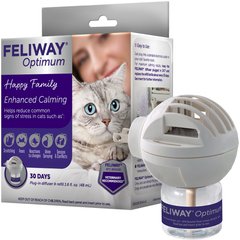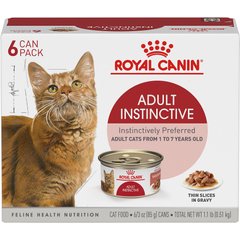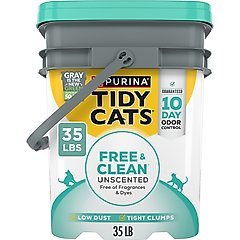Why Do Cats Bury Their Poop? Is This Normal?
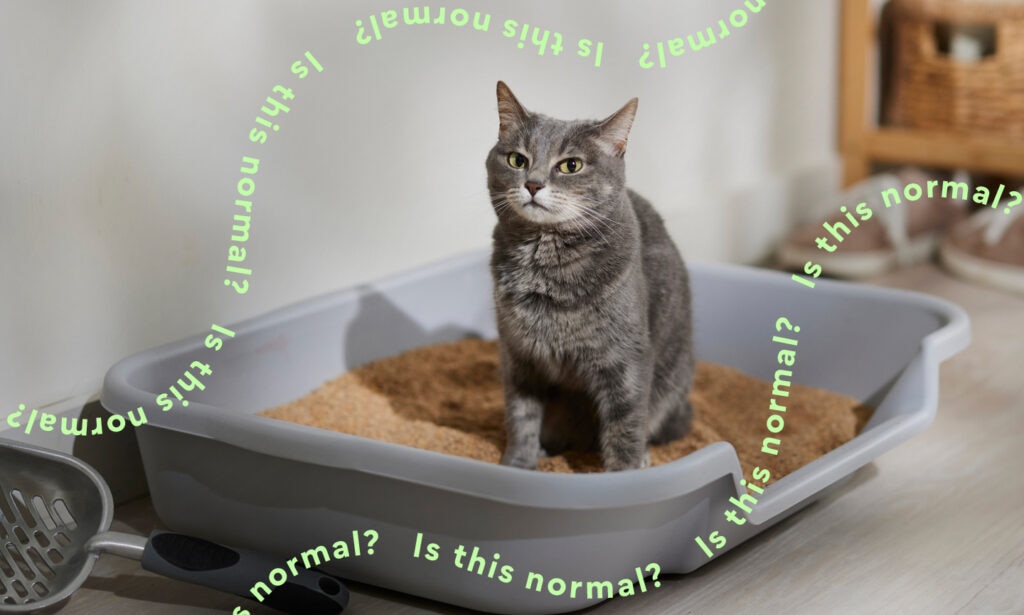
Photo by Chewy
Q: My cat covers their poop in the litter box every time they do their business. But why do cats bury their poop? Is this normal?
A: Yes, it’s completely normal for cats to bury their poop. Felines are highly renowned for their cleanliness—even when it comes to covering their feces. As with many other weird cat behaviors, this, too, is in their nature. Burying poop is deeply rooted as a survival instinct.
We spoke with Mieshelle Nagelschneider—cat behaviorist, author of “The Cat Whisperer,” and owner of The Cat Behavior Clinic in Seattle, Washington—to learn more about this intriguing (and rather considerate) behavior.
Why Do Cats Bury Their Poop?
Sure, cats are domesticated now—or at least for the most part, depending on the day. But when our feline friends bury their poop, there’s one reason for this behavior: It harks back to their wild ancestors, who lived by the “leave no trace” principle.
Instinct
When cats bury their poop, it’s 100% an instinctual, “survival of the fittest” evolved hardwired trait, Nagelschneider says. This also has a lot to do with cats’ cleanliness with regard to their bathroom habits.
Ultimately, cats take the extra step to bury their poop to avoid drawing predators to themselves and their whereabouts.
“Being as elusive as possible is important for survival, and scent is what predator and competitor cats are paying most attention to out in nature,” Nagelschneider explains.
A 2024 study showed that nursing female cats and kittens covered their poop more often compared to young and non-receptive adult females.
Researchers found that nursing females cover their feces as a way to hide chemical information and make it difficult for predators and other cats to find their nests. Kittens display similar behavior by covering their poop, as well as their siblings’ and nearby kittens’ poop.
“Leaving stool out is a bad idea,” Nagelschneider says. “Visually, it’s a sign to a predator to where the cat may be, and it’s a strong territorial message to other cats.”
The act of leaving poop uncovered essentially tells other cats that the territory has already been claimed. This is known as “middening”—a behavior more common in wild or outdoor cats than house cats, Nagelschneider says.
A cat wouldn’t leave their poop uncovered in their litter box for territorial reasons, but this is more likely to be seen on an outdoor trail where another cat will encounter a competitor cat’s poop, she adds.
Why Doesn’t My Cat Bury Their Poop?
Generally, it isn’t considered normal for cats to not cover their poop, Nagelschneider says. It depends on if a cat has been doing it since they were a kitten. While the majority of cats do bury their poop, some cats starting from kittenhood may not do so.
Here are a few reasons why a cat might not bury their stool.
Litter Box Issues
If your feline friend has suddenly stopped covering their poop, the reason might be related to their environment—specifically, their litter box.
According to Nagelschneider, common reasons for a cat not to cover their poop in the litter box include:
- The litter box isn’t as clean as your cat would like it to be. Clean the litter box one or two times daily with a cat litter scoop, and completely change the litter every 30 days to keep it up to your cat’s standards.
Recommended Products
- Your cat doesn’t like the litter. Some cats might not like scented, pellet, or food-based cat litter, whether it be because the litters have a strong scent or they are uncomfortable on the cat’s paws. Nagelschneider considers unscented, bentonite clay litters—like Boxiecat—to be the best for cats.
Recommended Product
- Your cat doesn’t like the type of litter box. Depending on your kitty, they might think twice about using their litter box if they find it isn’t big enough or if it’s a covered, top-entry, or automatic litter box. Some good litter box options to consider include the Petmate giant cat litter box or the Frisco extra-large senior cat litter box.
Recommended Products
- The litter box location is stressful for your cat. Believe it or not, cats need less privacy and more of a vantage point when it comes to their litter box placement. In their minds, this is to make sure they’re not going to get trapped in the back of a cave by a predator, a competitor cat, or a scary human toddler, Nagelschneider says. Cats consider a location that reduces their escape potential to be stressful. This can include areas:
- Inside a closet
- Under a desk
- In a litter box cabinet
- Between a wall and a dresser
- In high traffic areas or areas where they don’t have a good view of the territory
- They have other litter box issues. Not having enough litter in their litter box or enough litter boxes for a multi-cat household can also cause cats to feel stressed and not cover their poop.
If it seems like cats can be a tad particular about where they poop, it’s because they most definitely can! These reasons can all be true, even if they cover their urine and not their feces in the litter box, Nagelschneider says.
Health Issues
If you notice your cat has stopped covering their poop, Nagelschneider says a vet visit is crucial. In her experience, not covering up their stool can sometimes be the only indication of a health issue.
Suddenly not covering poop in the litter box can be a potential sign of health issues, such as:
- Parasites
- Bacterial infection
- Renal dysfunction
- Hyperthyroidism
- Gastrointestinal upset (after switching a cat’s diet suddenly, introducing new foods, etc.)
Age-Related Conditions
Osteoarthritis, for example, can lead to abnormal litter box behavior.
“We often see osteoarthritis resulting in limitations in mobility,” says Brad Krohn, DVM, veterinarian at The Cat Behavior Clinic. “This limitation can prevent kitties from properly maintaining their claws, causing them to overgrow and potentially puncture the paw pads. Overgrowth can lead to discomfort, and discomfort leads to less litter box covering behavior.”
Stress
Any kind of distress, discomfort, or difficulty pooping leads to changes in normal and instinctual litter box behavior, Nagelschneider says.
Small to significant changes can cause stress in cats. Examples of these might include:
- Rearranging furniture
- Moving to a new home
- Traveling
- Bringing home a new cat or other pet
- Bringing home a new baby
- Experiencing a family member’s illness
- Experiencing their own health issues
If your cat seems stressed, talk to your vet about potential solutions, like calming supplements, calming diffusers, or anti-anxiety medication.
Recommended Products
Physical stress can also result from eating too much dry cat food and not enough wet cat food, says Nagelschneider. As a result, their poop can become too firm and cause them stress when trying to empty their bowels.
Making sure your cat has enough wet cat food in their diet may help ease their bowel movements.
Recommended Products
Another potential cause is impacted anal glands.
If you have any questions about your cat’s behavior, speak with your vet.
Should I Do Something About My Cat’s Behavior?
Burying poop is completely normal cat behavior and doesn’t require any course of action. However, if your cat has stopped burying their poop, it’s best to consult your vet to rule out any potential health-related causes.
Nagelschneider recommends these tips to help encourage your cat to cover their poop:
- If their litter box is covered, uncover it and move it out into the open (as opposed to a hidden location).
- Use a clumping clay or unscented litter, such as Tidy Cats Free & Clean Cat Litter or Frisco Multi-Cat Scoopable Cat Litter.
Recommended Products
- Aim to fill the litter box with at least 3–4 inches of litter. “For depth of litter, more is better,” she says.
- Scoop the litter box daily and change it out every 30 days.
- Place the litter box somewhere that cats have the best view of the comings and goings of other cats and people in the home while they do their business.
FAQs About Cats Burying Poop
Q: Can litter box setup affect whether a cat buries their poop?
A: Yes, cats might not bury their poop because they’re dissatisfied with their litter box, whether it be because it isn’t clean enough, it’s too small, or they don’t like the litter or the litter box itself.
Q: Why do cats smell their poop before they bury it?
A: There are likely a few reasons for this behavior, Nagelschneider says. “Sniffing their own feces may help cats monitor their internal health,” she says. “Before burying [their poop], cats may assess whether the scent could attract predators or competitor cats.”
Q: Do feral cats always bury their poop?
A: According to a 2009 study, feral cats don’t always bury their poop. They may bury feces within their home ranges but leave them uncovered outside of that area.


